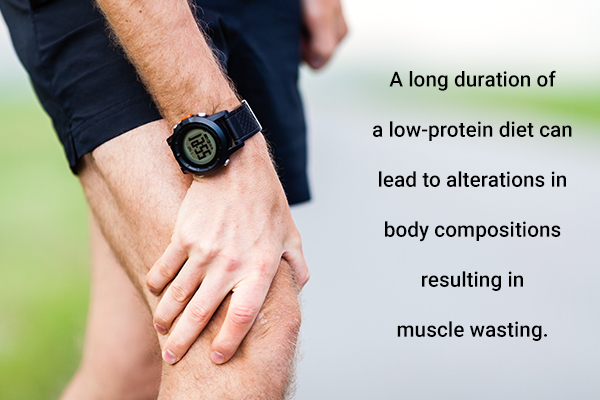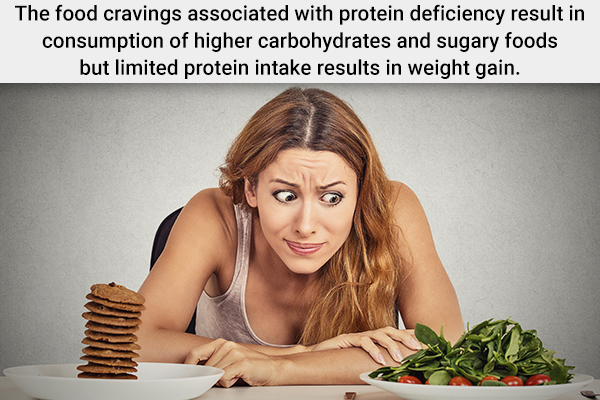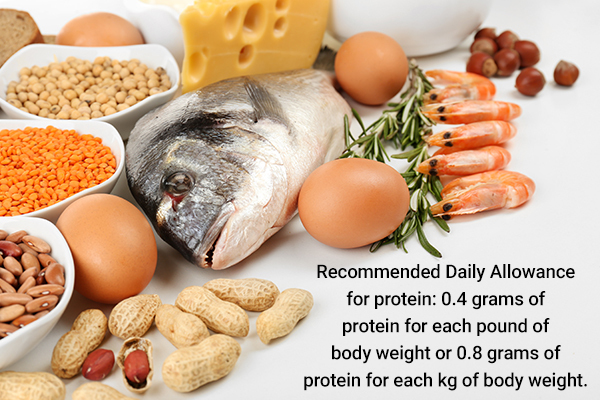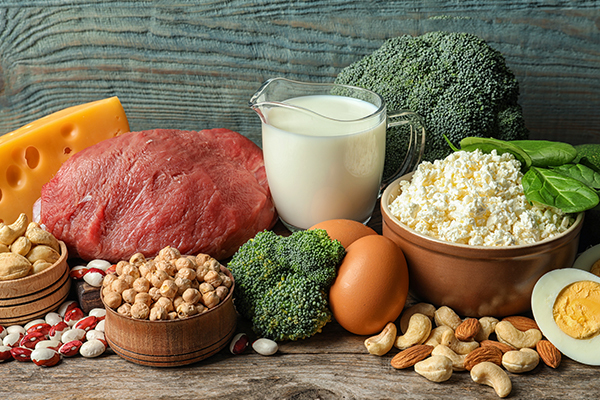In this article:
Protein is an essential building block for the structure, function, and regulation of cells and, in turn, tissues, vital organs, muscles, skin, enzymes, and hormones in the body. In simpler words, this nutrient is needed for building and repairing body tissue. Protein is also found in hemoglobin and antibodies. (1)

Protein provides a multitude of benefits to the body. An adequate protein status contributes to the regulation of blood sugar levels, healing of wounds, and fight against several pathogens that can cause infections.
Protein is found in numerous foods primarily in meats, fish, dairy, and eggs as well as some vegetables. (2) In smaller amounts, protein is also found in plant-based foods such as beans and seeds.
Although protein deficiency is not always an issue in developed nations, some underdeveloped and developing nations have limited resources for their people to consume and maintain a healthy protein-rich diet, which can ultimately cause protein deficiency and lead to a wide range of health concerns.
Signs and Symptoms of Protein Deficiency
A lack of protein in the body can manifest as the following:
1. Muscle weakness

In the body, muscles consist of substantial amounts of protein, which is necessary for building and maintaining muscle tissue. A long duration of consuming a low-protein diet can lead to alterations in body composition, resulting in muscle wasting. (3)
Wasting is the body’s response to acquire protein from sources other than food when protein intake is limited, ultimately compromising the body composition in exchange for energy needed for the body to function.
The elderly population is more susceptible to muscle wasting when they have a poor protein diet. A study has revealed that a richer protein diet can slow down the degeneration of muscles. (4)
2. Poor hair, nail, and skin health
Hair, nails, and skin are largely made up of proteins, namely, elastin, collagen, and keratin. Therefore, long periods of limited protein intake causing protein deficiency can lead to noticeable effects. Protein deficiency can lead to thin hair, hair loss, alopecia, and changes in hair color.
According to the American Academy of Dermatology, compromised hair health is the body’s method of terminating hair growth to conserve that protein for other important bodily functions. Additionally, unhealthy skin signals protein deficiency due to poor protein diets. (5)
3. Food cravings

During protein-deficient states, the body will communicate its desire for food via hunger cues. Food cravings increase appetite and calorie intake during these times to acquire protein from the diet for the adequate functioning and maintenance of the cells, tissues, and organs in the body. (6)
Unfortunately, the food cravings associated with protein deficiency lead to the consumption of higher amounts of carbohydrates and sugary foods but limited protein intake, resulting in weight gain. (7)
4. Lowered immunity function
Lack of protein can severely compromise your immunity and thereby increase the risk of contracting various infections. Not just that, protein deficiency also makes it harder for the body to overcome these infections, leading to severe symptoms and longer recovery. (8)
A study found that people who did not consume enough protein in their regular diet were more susceptible to severe influenza infection as opposed to those who got their recommended protein intake. (9)
5. Brain fog
Protein is essential for proper neurological functioning. Several neurotransmitters, including serotonin, dopamine, epinephrine, and norepinephrine, play an important part in helping you concentrate. (10)
A protein-sufficient diet can contribute to synthesizing certain neurotransmitters, which can lead to enhanced ability to work and complete tasks.
Therefore, brain fog as well as the inability to concentrate, be motivated, desire to learn, and recollect information can be an indication of low neurotransmitters that are required for your ability to focus. (11)
6. Poor sleep

Higher levels of cortisol, abnormal blood sugar levels, and lower levels of serotonin have been linked to poor sleep and insomnia.
Protein is essential for making serotonin, which in turn is essential for good sleep. Therefore, inadequate protein consumption leads to a decline in serotonin production, which hampers your sleep quality. (12)
Plus, an adequate-protein diet can slow down postprandial glucose levels by decreasing the absorption of glucose during meals. Maintaining a healthy blood sugar level is another important factor for improving sleep.
7. Poor bone health
Protein is essential for skeletal health. If you don’t get enough protein through your diet, your bones may become brittle and more prone to fractures.
A study found that postmenopausal women who followed a protein-rich diet had lower risks of hip fractures. The results indicated that 20 grams of protein daily for a duration of 6 months led to decreased depreciation of bone loss by 2.3%. (13)
8. Mood swings

Neurotransmitters are chemical molecules that pass messages between nerve cells or neurons as well as between neurons and muscle cells. This communication allows the brain to send and receive messages to and from the body.
These neurotransmitters are built from amino acids, which are the building blocks of protein. Therefore, protein deficiency can play a vital part in mood alterations. (14)
Other Signs of Protein Deficiency
The following changes can also indicate protein deficiency:
- Edema
- Fatty liver
- Digestive issues
- Irregular menstruation
- Increased susceptibility to injury
- Delayed healing
- Hindered growth in children
Causes of Protein Deficiency
Protein deficiency is also known as hypoproteinemia. Proteins levels are unique to each individual due to several factors such as age, body weight, muscle mass, and physical activity. (15)
Since protein is vital for everyday functions within the body, they are constantly being utilized. For this reason, it is essential to maintain protein status via a protein-rich diet. An inadequate protein diet can deteriorate your health.
Apart from the availability of resources, several other factors can contribute to protein deficiency such as:
- A very active lifestyle and strenuous exercise can deplete protein levels in your body over time.
- Certain dietary lifestyles such as veganism or vegetarianism do not include foods that consist of animal-based protein.
- Excessive consumption of alcohol and some drugs can hinder absorption.
- Some gastrointestinal ailments cause digestive disturbances, hindering the absorption of protein in the gut.
- Children can also be affected in nations that have limited availability of protein-rich resources and limited calorie intake.
Daily Protein Requirement

Different people have different protein needs. Several factors are taken into consideration before deciding one’s daily protein requirements, including:
- Age
- Gender
- Body weight
- Muscle mass
- Physical activity
Body weight has been the key player in calculating the recommended daily allowance (RDA), which stands at:
0.4 grams of protein for each pound of body weight or 0.8 grams of protein for each kg of body weight. (16)
According to the US Food and Drug Administration, the daily protein requirement for an average-weight man is 56 grams/day, whereas for women it is 46 grams/day. This is an estimated average. Individuals that have an active lifestyle, are pregnant, and/or have an illness may require additional protein intake from their diet.
As mentioned earlier, protein is found in several plant-based and animal-based diets. However, the optimal way to achieve adequate protein intake is through the consumption of both plant-based and animal-based protein diets. (17)
Nonetheless, animal-based protein diets are known to contain larger quantities of protein as compared to plant-based foods.
Dietary Changes to Improve Protein Deficiency

A combination of plant-based and animal-based protein diets can contribute to an adequate protein status. Although consumption of meats is known to have substantive protein, too much of it also has its cons.
Plenty of protein-rich vegetarian foods can contribute to increasing your protein intake, which can lead to better overall health. Adding lentils and legumes to your diet has multiple benefits. Apart from high protein, these foods can also aid in absorption and digestion.
Foods that can improve protein deficiency include:
- Cheese, eggs, Greek yogurt, and tofu
- Beans and legumes, such as adzuki beans, mung beans, and lentils
- Nuts and seeds, such as almonds, flax, chia, and hemp
- Ancient grains, such as oats, quinoa, farro, buckwheat, and amaranth
- Vegetables such as spinach, kale, broccoli, Brussels sprouts, and mushrooms
- Protein powders containing pea protein, bone broth
- Grass-fed beef, organic chicken, turkey, and wild-caught salmon
Diseases That Decrease Protein Levels
The diseases that can cause decreased levels of protein include:
- Anorexia
- Bulimia nervosa
- Liver dysfunction
- Kidney dysfunction
- Amyloidosis
- Celiac disease
- Inflammatory bowel disease
- Chronic obstructive pulmonary disease (COPD)
- Acquired immune deficiency syndrome (AIDS)
- Cancer
Final Word
Routine checkups with your primary care provider or general practitioner are key to maintaining a healthy life. If you are experiencing signs and symptoms of protein deficiency (mentioned above), consulting your healthcare provider is necessary.
Further testing by your healthcare provider such as blood tests can help identify potential health concerns affecting protein levels. (18) Abnormal results concerning these proteins may indicate further liver dysfunction, kidney dysfunction, or autoimmune condition.
The doctor will review your medical history, followed by a thorough physical examination and additional diagnostic tests, to identify the root cause of protein deficiency and then prescribe the appropriate treatment.
- Was this article helpful?
- YES, THANKS!NOT REALLY


